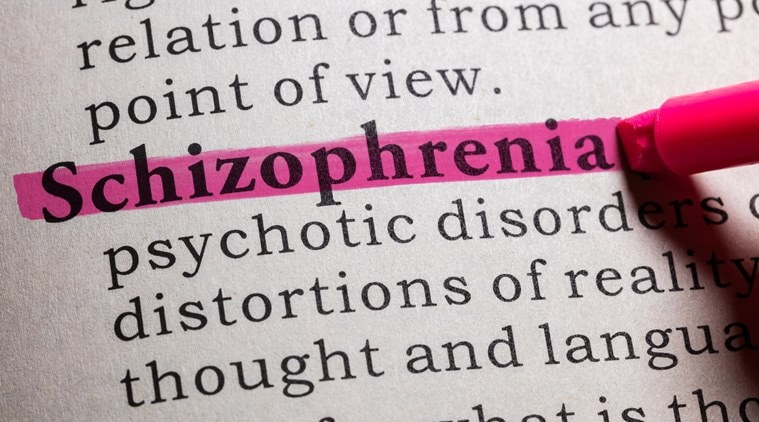Due to lack of awareness about mental illnesses, general people may perceive a threat from those suffering from Schizophrenia due to their actions and social inappropriateness in their behaviour.

Schizophrenia as a disorder withholds a diverse set of symptoms and signs differentially expressed across the patients and also differs over the course of illness. May 24 is observed as World Schizophrenia Day. The usual age of onset for adult Schizophrenia is 15 to 25 years although it can be seen as early as 5 years of age. However, childhood-onset schizophrenia (COS) is a rare condition with onset before the age of 13 years, which rises steadily through adolescence and reaches its peak in early adult life. According to a recent National Mental Health Survey (2015-2016) conducted by NIMHANS, the prevalence of Schizophrenia in the Indian population is 0.5 per cent for current and 1.4 per cent for a lifetime experience.

What is schizophrenia and how to identify it?
The most common symptoms ]are:
* Remaining aloof, loss of interest, aimlessness and social withdrawal.
* Muttering and smiling to self.
* Disturbance in thinking and perception in the form of delusions, hallucinations and unusual bodily sensations.
* They may also have persistent delusions that are culturally inappropriate and implausible, such as religious or political identity or superhuman powers and abilities, or that they are being talked about, stalked and followed, spied by some agencies.
* They may hear voices or see images, which in reality may not exist.
* Irrelevant or incoherent speech.
* They may feel that their thoughts are being broadcasted on television and internet, their thoughts being withdrawn by some external power, or they may not recognise their thoughts as their own, as if being inserted from outside
* Inappropriate and blunted effect, disinhibited and disorganised behaviour and speech
* Inability to maintain activities of daily living, poor self-care and poor hygiene decreased sleep and disturbed appetite abusive and assaultive behaviour (mostly in response to commanding voices and suspiciousness)
Not every individual with schizophrenia may exhibit all the above-mentioned symptoms.

How to manage the condition?
Schizophrenia is purely a psychiatric illness which requires immediate management and consulting a psychiatrist is advisable. There are standardised interview techniques and screening measures for such patients and mental health professionals are exclusively trained in that.
“Family members and other significant people can help by first taking the individual with these symptoms to a mental health professional, for psychiatric consultation, as early as possible rather than taking them to faith healers. These changes occur due to various factors in which the prime cause is an imbalance in neurotransmitters which can only be managed through proper and timely medications. Moreover, these behavioural changes are due to neurochemical imbalance and should not be seen as a character flaw or assigns of being possessed. Additionally, they should not try to correct the individual’s behaviour or should not get into arguments with them as they are not in the state to comprehend right and wrong. This might make them even more agitated. Apart from that, family members should try to maintain a stress-free environment around them as stress can aggravate the symptoms”, says Dr Venkatesh Babu GM, Consultant Psychiatrist, Fortis Hospital, Bengaluru.
Is Schizophrenia a lifelong affliction? Is there a cure for it? If left untreated, what happens?
Schizophrenia is a syndrome with multifactorial etiology and unlike diseases (for example malaria, typhoid etc), it does not have a cure. The target of management is symptom resolution and prevention of relapse. Earlier the onset of intervention and shorter the duration of untreated psychosis (DUP); better the outcome.
Can a person with schizophrenia lead a normal life?
Yes, people afflicted with schizophrenia being on regular treatment and adhering to medication can live a normal life. They can pursue their studies, make friends, maintain relationships and have a successful working life. These individuals can choose to marry and fulfil the roles and obligations of a marital life provided they are on regular medication to remain symptom-free. As marriage is a significant life event which brings about a lot of changes in one’s life, with a good family support system and one’s own preparedness about the possible stressful impact, they can have fulfilling marital life.

“Schizophrenia is a clinical condition, just like diabetes and hypertension where the target is symptom management, the need to maintain regular medication, proper sleep cycle and a stress-free atmosphere is a necessity”, Akanksha Pandey, Consultant Clinical Psychologist, Fortis Hospital, Bengaluru.
Are people with schizophrenia dangerous to people around them?
“People afflicted with Schizophrenia exhibit aggression mostly secondary to hallucinations (hearing voices speaking about them, threatening them or commanding them), delusions (persecutory in nature) and distorted ego boundaries which impairs their judgment about reality. Thus, people with schizophrenia are not dangerous to society but they could potentially harm themself or others — both known and unknown as a consequence of their abnormal psychic experiences”, Dr Venkatesh Babu.
Due to lack of awareness about mental illnesses, general people may perceive a threat from their actions and more so for the social inappropriateness in their behaviour. It is preferable not to be aggressive towards them, call them names or openly criticise them. Rather an empathetic approach proves to be more promising.
? The Indian Express is now on Telegram. Click here to join our channel (@indianexpress) and stay updated with the latest headlines
For all the latest Lifestyle News, download Indian Express App.
Source: Read Full Article



